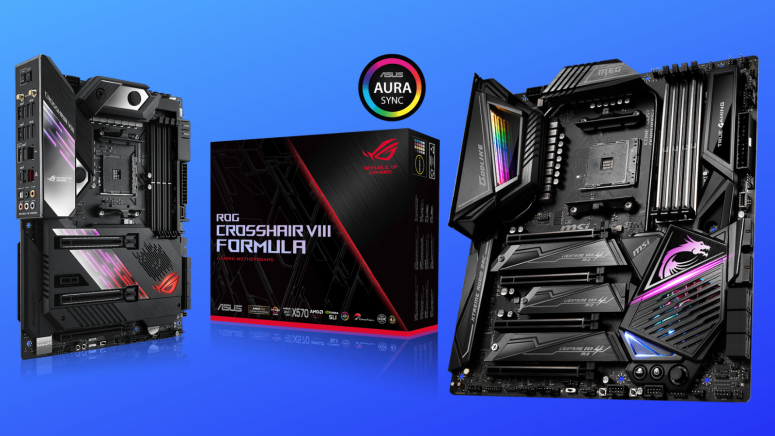
9 Best AMD X570 Motherboards in 2025 for AMD Ryzen CPUs
Everyone eagerly anticipated the AMD Ryzen 3000 platform as it marks the first CPU to transition to the 7nm process. The Ryzen 3000 CPUs starting from the six-core Ryzen 5 3600 to the 12-core Ryzen 9 3900X offer enough juice for gamers and content creators across all budgets.
With the launch of any new CPU, there is usually a new chipset to accompany it, and it's no different this time. AMD announced the X570 chipset for the Ryzen 3rd gen processors that brought support for PCIe Gen4 and improved overclocking. The X570 chipset builds upon the X470 chipset from last year and offers great performance for gamers and enthusiasts. The X570 chipset is also quite power-hungry due to the increased bandwidth of PCIe Gen4 and hence requires an active cooling fan in most cases to keep thermals under check.
All this means that motherboard OEMs have to go back to the drawing board to offer new motherboards that offer the best performance for AMD's new platform. The following 9 best X570 motherboards offer a great feature set, improved connectivity, and better aesthetics than their last-gen offerings. Let's check them out.
1. MSI MEG X570 ACE - Overall Best X570 Motherboard
The MSI MEG X570 ACE offers everything you'd want from an enthusiast AMD motherboard. With the X570 ACE, MSI is targeting both gamers and content creators with several unique offerings. These include a 2.5G onboard LAN, three PCIe Gen4 NVMe M.2 slots, a high fidelity ESS DAC for pro-quality audio, and support for the latest 3rd gen AMD Ryzen CPUs. You also get the latest Intel Wi-Fi 6 802.11ax standard support. The X570 ACE offers a beefy 12+2 phase VRM and four DIMM slots that can take up to 128 GB of DDR4-4633 RAM.
You get three PCIe x16 Gen4 slots that work at x16, x8/x8, and x8/x8/x4 speeds. The X570 chipset requires active cooling due to the high bandwidth PCIe Gen4 bus, so MSI provides its Zero FROZR cooling fan to keep the X570 chipset temps under check. There is also an additional heat pipe that goes all the way from the VRMs to the chipset for added heat dissipation.
Towards the rear, we find a plethora of connectivity options including dedicated buttons for clearing the CMOS and BIOS Flash. You can use the BIOS Flash by plugging a USB drive with the updated BIOS file into a dedicated USB port. The X570 marks the arrival of USB 3.1 Gen2 on AMD platforms and the X570 ACE offers three USB 3.1 Gen2 Type-A ports along with a USB 3.1 Gen2 Type-C port. An ALC1220 HD audio codec provides the required onboard 7.1-channel audio.
The MSI X570 ACE is not cheap, but you get a lot of hardware for the price. This board is clearly aimed at enthusiasts who wish to extract the maximum performance from the new Ryzen CPUs. One thing to note is that the board does not offer any video out, so those wishing to use Ryzen APUs with integrated Vega graphics should look elsewhere. If you are looking to upgrade your processor to Ryzen 7 5800X then this will be the correct pick
- Pros: Excellent choice of components; Great for overclockers
- Cons: Expensive; No onboard video-out
2. Asus Prime X570-P - Best Entry Level X570 Motherboard
The Asus Prime X570-P makes for a great entry-level solution to the AMD X570 platform and offers most functions needed to get up and running for both gamers and content creators alike. The Asus Prime X570-P offers an 8+4 VRM configuration, ProCool connectors, and durable caps for stable power delivery. You also get an onboard fan, and AIO controllers, which can be tuned via the included FanXpert 4 software or via the intuitive BIOS. The Prime X570-P features OptiMem for the efficient tracing of PCIe lanes. The board's design is very simple, and you will not find any flashy RGB in any area except for the chipset. However, there are enough RGB headers if you want to jazz up your case.
There is no rear I/O panel, but that's more of an aesthetic add-on than anything else. The heatsink cooling over the VRMs is adequate and can run the Ryzen CPUs without any issues. You get two PCIe Gen4 x16 slots and two PCIe Gen4 M.2 slots. The top x16 slot goes directly to the CPU, while the bottom x16/x8 slot goes to the chipset. Thus, you can enable AMD CrossFire if you have two GPUs.
One omission with the Prime X570-P is that there is no heatsink over the M.2 slots, so if you are running a fast PCIe Gen4 SSD, you need to ensure adequate cooling in the case to prevent thermal throttling. Connectivity options are good, but there's no Type-C port included. However, you do get a couple of USB 3.1 Gen1 Type-A and two USB 3.1 Gen2 Type-A ports along with HDMI-out if you want to use Ryzen APUs.
Audio and LAN are both handled by respective Realtek chips, and the board supports up to 128 GB of DDR4-4400 RAM. Overall, this is one of the best entry-level AMD X570 motherboards from Asus if you want to hop-on to the PCIe Gen4 bandwagon.
- Pros: Good feature set
- Cons: No USB Type-C
3. Asus ROG Crosshair VIII Formula - Best High-Performance X570 Motherboard
If you are looking for the ultimate in X570 performance, your search should end with the Asus ROG Crosshair VIII Formula. The Crosshair boards have always stood for enthusiast builds, and this year, the Formula takes things up a notch higher. The Crosshair VIII Formula is designed for water/liquid cooling enthusiasts and, as such, uses heatsinks designed by EKWB that feature ports for connecting custom water loops.
The board looks massive and features striking ROG symbols that are lit in RGB at both the I/O area and the chipset. Like many other X570 boards in this list, the Crosshair VIII Formula also uses an active cooling fan for the X570 chipset. The CPU is fed power via a 16-phase VRM design that is well-cooled. You also get 128 GB DDR4 RAM support and ECC support is built-in although, enabling it requires a compatible CPU.
There are three PCIe x16 full-length slots in x16, x8/x8, and x8/x8/x4 configuration so you can run AMD CrossFire, CrossFireX, and NVIDIA SLI multi-GPU setups. A single PCIe Gen4 x1 slot is also present for add-on cards such as an extra sound card or a broadcasting card. The I/O shield is pre-fitted, and the top of the shield also features an OLED display, which you can program to show system info or game stats in real-time. The back is reinforced with a metal backplate for added strength.
The Crosshair VIII Formula offers both regular Gigabit Ethernet and also 5 Gigabit Ethernet via the Aquantia AQC111 controller. Additionally, you also get Intel AX200 802.11ax Wi-Fi 6 adapter onboard. Audio is taken care of by the Realtek SupremeFX S1220 codec. Plenty of USB Type-A and Type-C ports are available at the back, and for those who need more, there are enough headers on the board for front panel Gen1 and Gen2 connectors. All these features come at a premium, so the Asus ROG Crosshair VIII Formula is one of the best premium AMD X570 motherboards in the market for overclockers and liquid cooling enthusiasts it also supports Ryzen 9 5900X motherboards as well.
- Pros: Fully loaded; Built for water-cooling enthusiasts
- Cons: Expensive
4. MSI MPG X570 Gaming Plus - Best Budget X570 Motherboard
The MSI MPG X570 Gaming Plus offers the perfect balance of price and performance in the AMD X570 range. The motherboard sports a decent feature set just enough for gamers but doesn't go overboard with a lot of things that enthusiasts look for. However, for users who need more than just a run-of-the-mill motherboard, the MSI MPG X570 Gaming Plus offers quite a lot for the money.
The board offers two PCIe Gen4 x16 slots, so you can run AMD CrossFire setups (no SLI, unfortunately). The board sports a gamery look with the characteristic red and black accents. The CPU power is fed by an 8+2 VRM setup that is cooled well by passive heatsinks. You also get 8-pin and 4-pin CPU power supplies. For a seemingly entry-level board, the MPG X570 offers support for up to 128 GB of DDR4-4400 RAM. Ryzen works best with the fastest RAM available, so the option to use OC memory is very much welcome. There are also three PCIe Gen4 x1 slots for add-on cards and two PCIe Gen4 M.2 slots for SSDs.
The back panel has a fair selection of ports for the price. There's both HDMI and USB 3.1 Gen2 Type-C available, along with a BIOS Flashback button to reset the BIOS in case any setting messes with the booting up. Another good addition is the Realtek ALCS1220 audio codec that is usually found only in more premium boards.
Gamers might find the absence of RGB on the board a turn-off, but there are enough headers for you to use your own RGB strips. For the price, though, you can a very good feature set that can complement the new Ryzen 3000 CPUs very well.
- Pros: Well priced; Decent feature set
- Cons: None as such
5. Gigabyte X570 Aorus Ultra - Mid-Priced X570 Motherboard
Gigabyte has some very interesting offerings for the AMD X570 platform, and the X570 Aorus Ultra is definitely one of the more exciting boards on offer. The X570 Aorus Ultra offers a 12+2 VRM design with a fins-array heatsink and direct touch heat pipe for effective VRM cooling. You get the option of using both ECC and non-ECC DDR4-4400 RAM up to 128 GB. You also get three PCIe Gen4 x16 slots and three PCIe Gen4 M.2 slots for connecting ultra-fast storage drives.
Networking is well taken care of by the onboard Intel LAN and support for Wi-Fi 6. The PCIe slots can run in x16, x8/x8, and x8/x8/x4 speeds, respectively, implying support for both NVIDIA SLI and AMD CrossFire. Additionally, you also get two PCIe Gen4 x1 slots as well. All three PCIe Gen4 M.2 slots come with pre-installed heatsinks to prevent thermal throttling of the SSD at high speeds.
Intersting Pick: The Best SATA SSDs — Speed Up Your Storage
There are also six SATA ports available in case you need to use conventional HDDs or SSDs. The board is aesthetically well-designed, and you get RGB near the integrated I/O shield that can be controlled via the RGB Fusion 2.0 software.
The rear panel has all the standard ports one expects from a top-end X570 motherboard, including two USB 3.1 Gen2 Type-A and one Type-C port. There's also an HDMI-out for those who prefer using Ryzen APUs. Overall, the Gigabyte X570 Aorus Ultra is a nicely built board that perfectly compliments the new Ryzen 3000 platform as well; it can support Ryzen 5 5600X.
- Pros: Good feature set; Good power delivery
- Cons: None as such
6. Gigabyte X570 Aorus Pro WiFi - Best Mid-Range X570 Motherboard
The Gigabyte X570 Aorus Pro Wi-Fi is a mid-range AMD X570 offering that is positioned next to the high-end Aorus Ultra. The Aorus Pro comes in both Wi-Fi and non-Wi-Fi offerings, which you can look into if you want to save a few bucks.
The Aorus Pro offers the same 14-phase VRM as the more expensive Ultra, which is great for overclockers. RAM support is offered up to 128 GB of DDR4-4400. There are three PCIe Gen4 x16 slots and two M.2 slots with built-in heatsink along with six SATA ports.
Towards the rear, we find the usual array of connectivity options, including several USB ports and HDMI. There isn't too much of a difference with the Aorus X570 Ultra save for the lack of an additional PCIe M.2 slot. Thus, this motherboard makes a great buy for those looking at a cost-effective gaming solution based on the AMD X570 platform.
- Pros: Good feature set; 14-phase VRM
- Cons: None as such
7. Asus ROG Strix X570-E Gaming - Best X570 Mid-Range Gaming Motherboard
For those not keen on the flagship Crosshair or the budget Prime series, the Asus Strix series offers a good mid-range alternative for gamers. The ROG Strix X570-E is the premium offering in the Strix lineup and comes with a very good feature set. The board offers three PCIe x16 Gen4 slots that can support NVIDIA SLI and three-way AMD CrossFire multi-GPU configurations. You also get dual M.2 PCIe Gen4 slots and built-in 2.5G LAN and 802.11ax Wi-Fi 6 for fast networking.
The PCIe slots operate at x16, x8/x8, and x8/x8/x4 speeds, with the first slot directly going to the CPU. Like most other X570 boards, the Strix X570-E also features a fan for actively cooling the chipset. Additionally, you also get eight SATA ports and four DDR4 RAM slots.
The Strix X570-E Gaming motherboard borrows a lot from the high-end Crosshair series, so you won't be missing any of the essential gaming features. Connectivity-wise, the board has you covered in terms of USB 3.1 Gen1 and Gen2 ports along with enough front panel USB headers. If you are looking for one of the best X570 gaming motherboards that are not as overly expensive as the top-end Crosshair offerings, the Strix X570-E gaming should be at the top of your list.
- Pros: Very good feature set; 2.5G LAN
- Cons: Slightly expensive
8. MSI MEG X570 Godlike - Best High-End X570 Motherboard
What do you do when you desire the absolute beast of an X570 motherboard with a seemingly infinite budget? You buy the MSI MEG X570 Godlike motherboard. The X570 Godlike aims to live up to its Godlike name by offering a wealth of features not found in any other AMD X570 motherboard to date. Featuring a whopping 20-phase power delivery for extreme overclockers, the X570 Godlike offers an extremely robust power supply for stable overclocking, so those pushing higher clocks on advanced cooling such as liquid nitrogen will find this board to be literally a blessing. The X570 chipset is cooled by MSI's Zero Frozr technology that uses a single fan with double ball bearings.
You can use up all four DIMM slots with up to 128 GB of DDR4-4800 OC RAM. There is also an OLED display near the memory slots that can be programmed to give out vital system info or game stats in real-time. The Godlike comes with several accessories, including two add-on cards. One of these cards offers an Aquantia AQC107 10G LAN, while the other is an M.2 expander card that allows you to add two additional M.2 SSDs apart from the three already onboard. The M.2 card comes with its own fan for cooling as well.
At the rear panel, you get all the ports you ever need including USB 3.1 Gen2 Type-A and Type-C, along with a dedicated 6.3 mm jack for using studio-grade headphones without having to purchase an additional converter. Audio is provided by two Realtek ALC1220 codec with ESS E9018 DAC for excellent clarity. There is a dedicated Type-A port for flashing the BIOS along with a clear CMOS button.
While there is a bundled 10G Ethernet card onboard, you get both Gigabit as well as 2.5G Ethernet. The MSI MEG X570 Godlike is clearly not for mere mortals, and the high price tag seems to suggest that as well. However, if you have the budget and are looking for the absolute best X570 motherboard, there aren't many other options.
- Pros: Fully loaded with features; Dedicated 6.3 mm audio jack; 20-phase VRM; Add-on cards
- Cons: Expensive
9. ASRock X570 Steel Legend - Best X570 Motherboard Under $200
The ASRock X570 Steel Legend is for those who do not need all the features of the X570 Taichi but still require a capable motherboard for gaming and content creation. The Steel Legend sports a camouflaged design with black contrast to help identify the various components. You get RGB on the I/O shield and the chipset heatsink area. It is not overly dominating yet lends a subtle charm to the overall aesthetics.
The feature set is more or less the same as the Taichi with a few differences with respect to the PCIe slots and RAM support, which is restricted to a maximum of 64 GB. There are two M.2 Gen4 slots for SSDs along with eight SATA supports that can operate in RAID 0, 1, and 10 arrays. There is support for U.2 drives as well.
All standard connectivity options are present, along with the presence of a DisplayPort in addition to HDMI in case you want to use Ryzen APUs with integrated Vega graphics. There are both Wi-Fi and non-Wi-Fi variants available. Those looking at a good X570 gaming motherboard around the $200 mark should definitely take a look at the ASRock X570 Steel Legend.
- Pros: Good for mid-range gamers; Unique camouflage design
- Cons: None as such
That was our round-up of the best AMD X570 motherboards to buy. Remember that this is still a new platform, so there is definitely a lot of scope for performance improvements with new BIOS updates over time.
The X570 boards are somewhat priced higher, so if you don't require the additional PCIe Gen4 lanes and massive overclocking, consider the more budget-friendly B450 motherboards that can very well support the latest Ryzen 3000 processors without a hitch.














